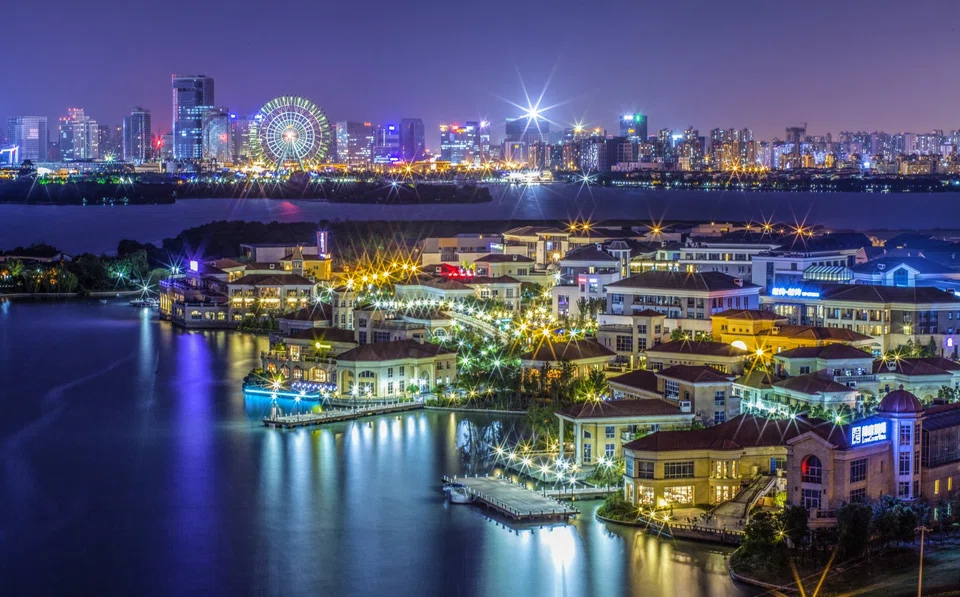How enterprises survive in China's smart cities
Some survive by possessing core technologies, some survive by promoting an exciting concept, some by self-transformation, others by buying out and inheriting superb small companies. Prof Chen Xi shares the various tactics for enterprises to survive and benefit from smart city market restructuring. Where will the new battleground of smart city projects be and how can Singapore play a role?

China has become the world's largest market for smart city projects which the Chinese government greatly supports. The development of smart cities in China takes into consideration the short term goal of strengthening market supply, and the long term goal of improving development efficiency.
Smart cities and the digital economy
Generally, the smart city is made up of three parts: one, the base or foundation that includes optical cables, 5G network, data centre and others; two, the big data level that includes cloud computing; and three, the application level that includes virtual reality, self-driving technology, e-government and others. Artificial intelligence and cybersecurity are integrated into all three parts.
Smart cities are subsets of the digital economy which includes a multitude of hardware suppliers for smart city initiatives such as mobile payment, remote healthcare and education, and high definition games. These suppliers form a large digital economy supply chain network and provide jobs based on digital technology. According to China's Ministry of Industry and Information Technology, the scale of the country's digital economy has reached 31 trillion RMB, occupying one-third of China's GDP.
However, to the main funders (mainly the Chinese government) of smart city projects, having gone through a five-year-long wave of smart-city building, they have recognised a few problems that are difficult to solve.
Deep-seated problems
...small and medium enterprises that fly the "smart city" flag up high but lack hard and core technology may also go bankrupt...In such a situation, a better strategy could be a buy out by another company.
On the technological level, urban planning is not an exact science, where everything can be measured and given a value to. Although big data and geographical information systems can create digital maps and management cockpits (integrated platforms that utilise big data and AI in decision-making processes) that help to illustrate and analyse problems in city operations, current technology remains unable to replace human intervention and decision-making. Demands for basic services like accommodation and healthcare facilities remain urgent in developed and developing countries alike. Any smart city design would need to take these fundamentals into account.
More importantly, in light of a global economic slowdown, including that of China's, smart city projects that are originally slow in returns add on to the financial pressures of the government. Under these circumstances, smart city vendors that lack a competitive edge will be heavily burdened by project income and financial returns.
Furthermore, small and medium enterprises that fly the "smart city" flag up high but lack hard and core technology may also go bankrupt. Hard and core technology refers to cutting-edge technologies with a higher benchmark for entry, making it more difficult to duplicate and imitate. They typically require long-term investments and extensive research and development processes, but also bring in good returns. In such a situation, a better strategy could be a buy out by another company.
How enterprises survive in China's smart cities
On the upside, four types of enterprises may benefit from smart city market restructuring.
The first type of enterprises are the ones forming the base or foundation of the information and communications technology sector, such as Huawei and ZTE Corporation. Demand for new generations of telecommunication infrastructure such as 5G or 6G networks, as well as the maintenance of the existing 4G network, will always be present. These enterprises also have their own challenges: in the face of a slowdown and market pressure to sustain substantial growth, revenues that could be shared amongst business partners may be reduced.
These companies create high-quality manufacturing jobs and have control over longer supply chains. They are on the frontline of the China-US geo-tech competition. Some examples of these companies include leading server providers such as Sugon and Inspur, as well as Unigroup, which holds a longer value chain involving Spreadtrum Communications (CPU provider), Yangtze Memory Technology (NAND Flash provider) and New H3C (integrated system provider). However, due to increased conservatism, America enterprises such as Google, Cisco or Oracle, Singapore investors such as GIC or Temasek, as well as China enterprises will fuse entrepreneurial strategies and national strategies more and more.

...the company's increased valuation as a result of participation in smart city projects is worth far more than the project itself.
The second type of enterprises are mega Internet companies such as Alibaba and Tencent. Unlike the first type of enterprises that possess hardware, these enterprises cater to the needs of the people through the provision of Internet services, and have a higher net profit rate. The strategy of their smart city business is two-pronged: on one hand widening their data pool, while on the other hand increasing the enterprises' market valuation through the leading-edge concept of smart cities.

In the case of Alibaba and Tencent, cloud computing brings in the bulk of its revenue in smart city projects. This could amount to US$1.5 to 3 billion, which is a fraction of their annual income of US$35 to 45 billion. However, the company's increased valuation as a result of participation in smart city projects is worth far more than the project itself. For example, if their valuation stands at US$350 to 400 billion, every 1% increase in valuation will earn them an approximate US$3.5 to 4 billion worth of increased valuation. Thus, the market's heavy support of the fresh and exciting concept of a "smart city" and its resultant benefits are more valuable than the project's actual revenue.
The third type of enterprises are the successfully transformed consumer products suppliers. In the future, lines will be blurred between consumer products and government-enterprise markets. Consumer products suppliers will face competition from Internet enterprises and traditional enterprise-government business suppliers, such as Xiaomi, JD, Alibaba and Huawei. The battleground in this field will be intense and interesting. Consumer products suppliers unable to establish cloud computing, edge computing and artificial intelligence could be taken over by cloud computing giants.
Should they utilise their financial advantages and offer shareholdings or holdings to global small and medium enterprises that possess hard and core technology, not only can they strengthen their smart city business, they can also increase their company's valuation.
The fourth type of enterprises are financial enterprises such as Ping An Co. Ltd and China Construction Bank. They are more disadvantaged than the first type of enterprises in terms of research and development of products with hard and core technology. However, they have the same edge as the second type of enterprises in that they possess a high-profit rate and can also increase their valuation through participation in smart city projects.
Should they utilise their financial advantages and offer shareholdings or holdings to global small and medium enterprises that possess hard and core technology, not only can they strengthen their smart city business, they can also increase their company's valuation. In fact, Wall Street financial enterprises like Vanguard and Blackrock have already invested in core components suppliers in the foundation or base of the information and communication technology sector prior to 2010.

Singapore, Japan and Europe enterprises are collaborating with Chinese companies and joining forces to enter and expand a third party market to alleviate political and commercial risks.
Tactics for developing smart cities have already matured, consisting of a basic chain from top-level design, solution design to actual production. Against the backdrop of the China-US geopolitical and technological competitions, the new battlefield pertains to the capacity for formulating and implementing strategies, especially in the acquisitions of SMEs or start-ups which possess hard and core technology globally.
For example, Singapore, Japan and Europe enterprises are collaborating with Chinese companies and joining forces to enter and expand a third party market to alleviate political and commercial risks. This is a goal that various governments hope to achieve to safeguard multilateral cooperation mechanisms and free trade, which are of utmost importance in an ever-changing global geopolitical landscape.





![[Photos] Fact versus fiction: The portrayal of WWII anti-Japanese martyrs in Taiwan](https://cassette.sphdigital.com.sg/image/thinkchina/3494f8bd481870f7c65b881fd21a3fd733f573f23232376e39c532a2c7593cbc)